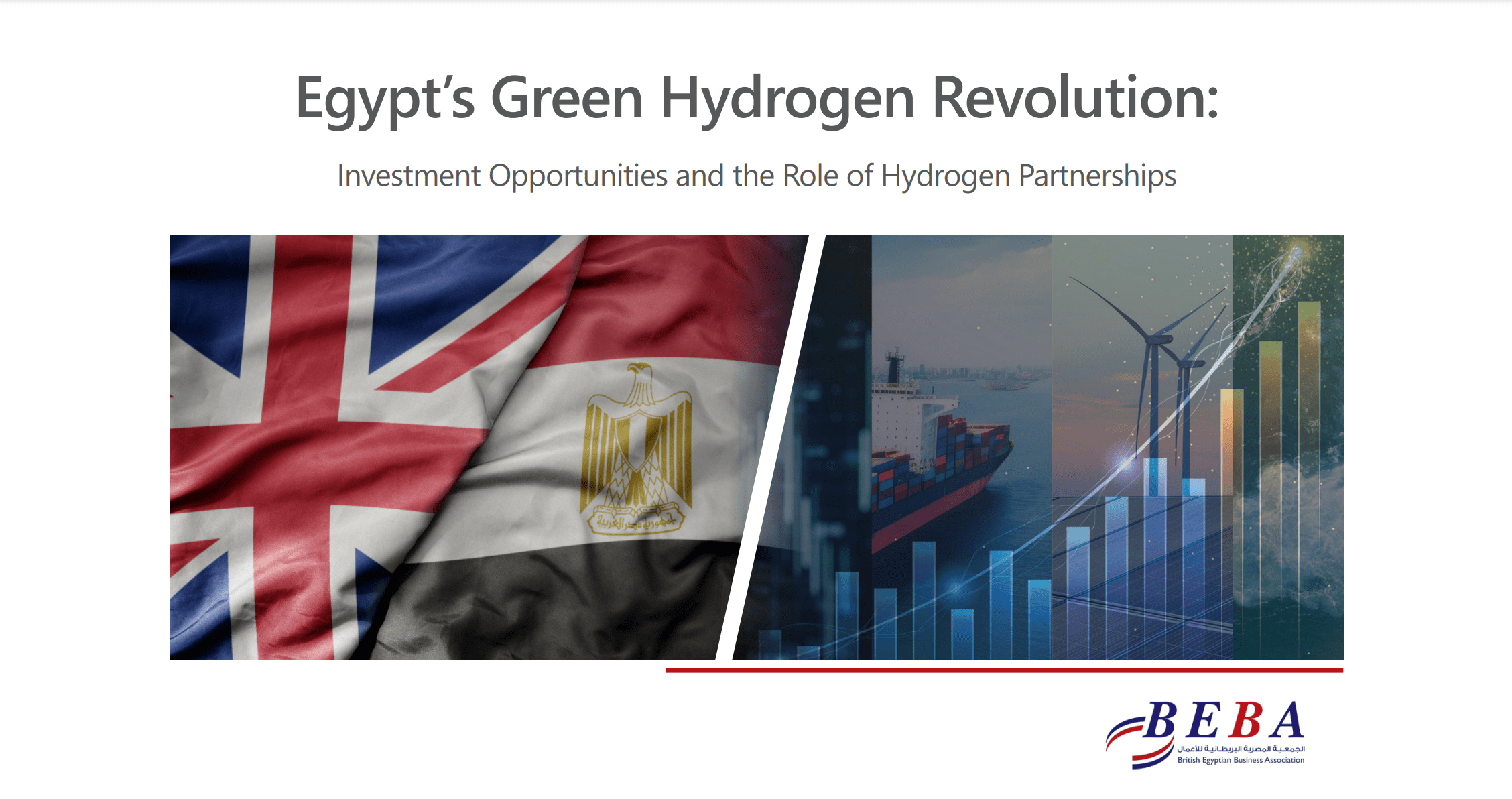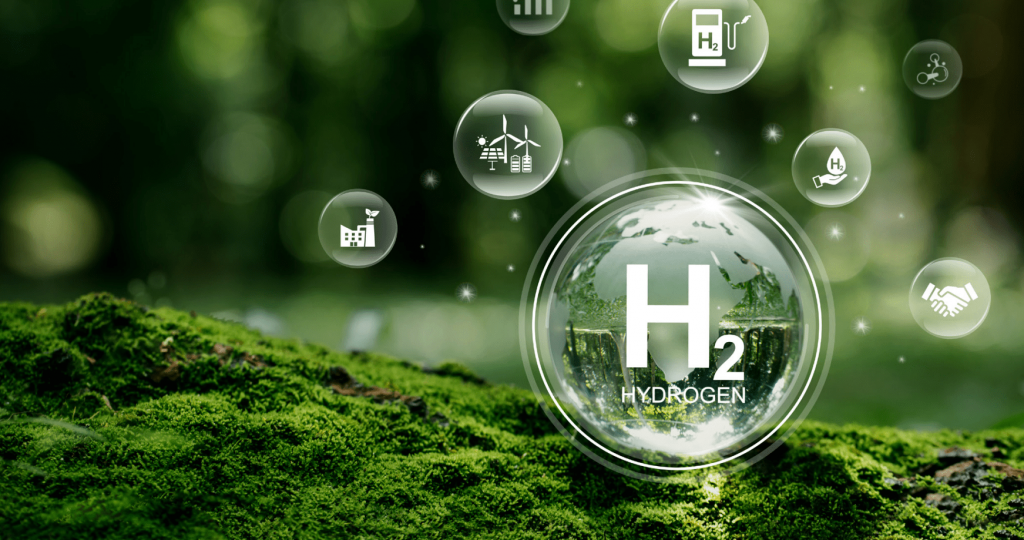
BEBA Annual Business Mission to the UK- September 18-20, 2024
As the global energy landscape rapidly shifts towards cleaner, more sustainable energy solutions, hydrogen, especially green
hydrogen, is emerging as a key player in the race to achieve net-zero emissions. Egypt, with its strategic location and abundant
renewable energy resources, is positioning itself to become a leader in the green hydrogen market. During the BEBA (British
Egyptian Business Association) Mission to the UK from 18-20 September 2024, a series of events will take place to explore and
discuss the investment opportunities Egypt offers in green hydrogen, Carbon Border Adjustment Mechanism (CBAM), and the
nation’s industrial potential for synergies with global partners.
The Importance of Hydrogen in Global Decarbonization Efforts
Hydrogen, particularly green hydrogen, is produced by splitting water molecules using electricity generated from renewable energy sources such as wind or solar power. As a clean energy carrier, it has the potential to replace traditional hydrocarbon-based fuels, decarbonize energy-intensive industries, and significantly reduce carbon emissions across sectors like transportation, manufacturing, and power generation. The transition to hydrogen is crucial for countries seeking to meet their climate goals and move away from fossil fuels. For Egypt, the hydrogen economy represents a unique opportunity to capitalise on its natural resources while addressing both domestic energy needs and export potential.


Egypt’s Hydrogen Strategy: Aiming for Global Leadership
Egypt’s ambitious plan to capture between 5% and 8% of the global green hydrogen market by 2040 is grounded in its strategic
advantages: abundant sunshine, high wind potential, and a favourable geographic location close to European markets. At the 2023
UN Climate Conference (COP27), Egypt officially unveiled its hydrogen strategy, which aims to bolster its GDP by up to $18 billion
and create 100,000 jobs by 2040 through green hydrogen development.
The country has signed over 20 (MoUs) with international partners to develop green hydrogen projects, many of which are
concentrated in the Suez Canal Economic Zone (SCZone). This area, which hosts 15% of the world’s maritime trade, is ideally situated
to serve as a hub for the production and export of green hydrogen and its derivatives such as ammonia and methanol, crucial for
industries like shipping and fertilisation (State Information Service of Egypt, 2022).
“Green hydrogen will play a very significant role
in decarbonising industry, transportation and our
power grids in our drive to achieve Net Zero.
With its world class solar and wind resources,
as well as its proximity to major global markets,
Egypt is very well placed to play a leading role in
the development of the green hydrogen economy.
Peter O’Sullivan, CEO, Penspen

Investment Opportunities in Egypt’s Hydrogen Economy
With over $83 billion in hydrogen-related projects already in the pipeline, Egypt is emerging as a hotspot for investors looking to tap into
the fast-growing hydrogen market. One of the largest investments includes the Ain Sokhna green hydrogen plant, Africa’s first integrated
renewable hydrogen facility, which began operations in late 2023. This plant, located within the SCZone, is part of a consortium that aims
to produce green ammonia, with the first-ever batch shipped to India in November 2023 for use in manufacturing.
Egypt’s investment climate for hydrogen is further boosted by favourable legislation. In early 2024, the Egyptian parliament ratified
new laws offering tax exemptions and incentives for companies engaged in hydrogen production. These include a tax rebate ranging
from 33% to 55% of income tax paid, VAT exemptions on essential machinery and raw materials, and a reduced export VAT rate of
0% for green hydrogen and its derivatives.
Additionally, companies working in the hydrogen sector will benefit from simplified approval processes, employment flexibility, and
reduced land-use fees, making Egypt a highly attractive destination for green hydrogen investments.
Overcoming Investment Challenges
Despite the clear opportunities, investing in Egypt’s hydrogen sector does not come without challenges. The country’s high funding
costs, driven by political risks, external debt, and inflation, pose a significant barrier to capital-intensive hydrogen projects. Egypt’s
external debt surged from $48 billion in 2015 to $165 billion in 2023, raising concerns about currency devaluation and its impact on
foreign investment.
Additionally, hydrogen production is capital-intensive, requiring substantial upfront investment in renewable energy infrastructure.
The International Energy Agency (IEA) estimates that an increase in the cost of capital from 6% to 15% could lead to a 70% rise
in production costs for green hydrogen. To mitigate these risks, the Egyptian government is working closely with international
organisations, including the European Bank for Reconstruction and Development (EBRD), to structure financing solutions that
combine public and private funding.
Moreover, high electricity costs, essential for green hydrogen production, present a challenge. Electrolyser costs—the technology
used to produce hydrogen from water—are expected to decline by 2050, but they remain high for now, with prices ranging from
$650 to $1,000 per kilowatt in 2020. To address this, Egypt is offering significant incentives to reduce hydrogen production costs,
including customs tax exemptions, corporate tax rebates, and partial government funding for utility connections and staff training.
Hydrogen Partnerships and the Role of CBAM
The EU’s Carbon Border Adjustment Mechanism (CBAM), set to be phased in over the coming years, is designed to prevent carbon
leakage by taxing imports of carbon-intensive goods into the European Union. For Egypt, which exports large volumes of emissionintensive products such as steel, aluminium, and fertilisers to the EU, CBAM presents both a challenge and an opportunity.
On the one hand, CBAM could disrupt Egypt’s export-driven industries by making its carbon-intensive goods less competitive in the
EU market. On the other hand, the mechanism incentivises countries to decarbonise their industries, making them CBAM-compliant
and thus able to maintain their export volumes to the EU. For Egypt, the development of a robust green hydrogen sector offers a
pathway to decarbonising its industrial processes and maintaining its competitiveness in the global market.
By strategically aligning hydrogen partnerships with CBAM compliance, Egypt can facilitate the decarbonization of industries like
fertilisation and steel production, ensuring that these products can continue to be exported to the EU without facing hefty carbon
tariffs. This alignment could also help address concerns in emerging economies about the competitiveness of emission-intensive
local production, by integrating hydrogen partnerships with broader industrial development goals.
Synergies with the Global Hydrogen Market
As the hydrogen market evolves, Egypt is uniquely positioned to serve as a regional hydrogen hub, facilitating synergies with
Europe, Africa, and the Middle East. The EU, through its European Hydrogen Bank and H2 Global auction mechanism, is actively
seeking hydrogen imports to meet its renewable energy targets (Federal Ministry for Economic Affairs and Climate Action, 2023).
Egypt’s proximity to Europe, coupled with its vast renewable energy resources, makes it an ideal supplier of green hydrogen to
European markets.
Moreover, Egypt is a member of the Africa Green Hydrogen Alliance, which includes other regional hydrogen powerhouses
like Morocco and South Africa. These partnerships foster cross-border collaboration, enabling the development of hydrogen
infrastructure and technology sharing that can benefit the entire region.
Upcoming Discussions at the BEBA Mission to the UK
During the upcoming BEBA Mission to the UK, key stakeholders from the Egyptian government, international investors, and industry
leaders will gather to discuss the opportunities and challenges of Egypt’s burgeoning hydrogen sector. The event will cover critical
topics such as investment prospects, the impact of CBAM, and potential synergies between Egypt’s hydrogen industry and global
markets. This mission is a critical step in solidifying Egypt’s role as a global leader in green hydrogen production and ensuring that
the country is well-positioned to benefit from the rapidly growing demand for clean energy.
